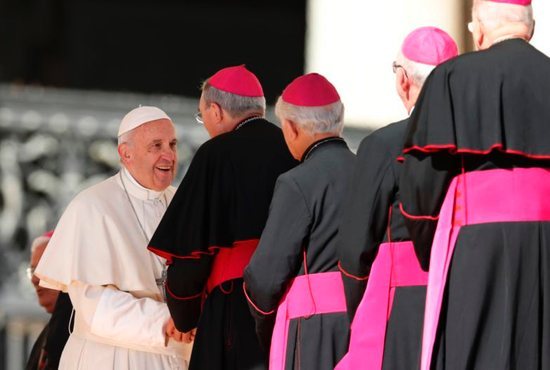Irish bishops travel to meet Pope Francis filled with hope and realism, writes Archbishop Eamon Martin
This weekend the Irish bishops travel to Rome to begin a two-week pilgrimage “to the threshold of the apostles” (ad limina apostolorum).
It is 10 years now since the Irish bishops were last called to make their ad limina visit – on that occasion, the bishops met with Pope Benedict XVI. Much has changed for the Church in Ireland and in the world since then.
I am looking forward to spending this time with my fellow bishops – less than half of us have previously been on an ad limina visit so it will be an exciting experience.
During the pilgrimage we will have the opportunity to pray and celebrate Mass together at Rome’s four major basilicas – St Peter, St Mary Major, St Paul outside the Walls and St John Lateran.
We also hope to meet with Irish priests, religious and members of the Irish community in Rome and to visit the Irish Dominicans at San Clemente and the Irish Augustinian Church of St Patrick.
Purpose
The central purpose of the ad limina visit is to celebrate and deepen our communion with the universal Church and with the Successor of St Peter, Pope Francis.
We look forward to reporting to the Holy Father and to the various offices of the Roman Curia about the pastoral situation of our dioceses and of the Church in Ireland. Knowing that we in Ireland are members of ‘one, holy, Catholic and apostolic Church’, it will be also good to hear from them their hopes and wise counsel gained from regular encounters with our fellow bishops from every corner of the world.
The highlight of our visit will be our meeting and dialogue with Pope Francis himself.
I will bring him warm greetings of affection from the Catholic people of Ireland and thank him for the powerful witness and challenge he continues to present, particularly with regard to reaching out in a mission of mercy to those who are on the peripheries of Church and society.
It will be a chance to thank the Pope for the gift of the ‘Year of Mercy’ which we have just celebrated and for honouring Ireland with the privilege of hosting the World Meeting of Families in Dublin in August 2018.
Looking back over all that has happened since the last ad limina visit of the Irish bishops in 2006, we will be able to share the determined efforts we have been making to safeguard children and vulnerable persons in Church activities and our commitment to bringing healing to all those affected by the sinful and criminal acts of abuse.
I will assure Pope Francis that it remains a major priority of the Church in Ireland to acknowledge and learn from the past, as Pope Benedict XVI exhorted us in his 2010 letter, “to reflect on the wounds inflicted on Christ’s body”, and “persevere in our efforts to bind those wounds and heal them”.
No doubt Pope Francis and the other curial officials will be interested to learn how we are facing the current challenges of a decline in Mass attendance in Ireland and in the number of vocations to the priesthood and the religious life.
I, and my fellow bishops, will be able to share with them the resilience of our priests and religious under increased pressure and workload, as well as the tremendous generosity and kindness of the faithful towards us.
We will be able to discuss the seeds of renewal and new growth in catechesis, lay involvement, intentional discipleship and pastoral outreach that are emerging all over the country.
The challenges facing the Church in Ireland are not unique to us so we will be anxious to learn about how bishops in other parts of Europe are confronting issues like migration, economic hardship, and sweeping secularism which can at times be dismissive of people of faith.
Committed
I will confirm to Pope Francis and the leaders of the various curial departments of the Holy See that many Catholics in Ireland remain wholly committed to playing their part in Irish society and to witnessing to their faith in the public sphere.
With so much uncertainty around us – homelessness, economic hardship, violence on the streets, problems with mental health and the awful spectre of suicide, lack of hope and purpose in the lives of many of our gifted young people – the voice of faith needs to be heard in Ireland today more than ever.
We must continue to promote respect for the dignity of every person, starting with the weakest and the most defenceless. People in Ireland yearn to hear the Good News of Jesus Christ and to experience a living, loving encounter and relationship with God.
The future of the Catholic Church will perhaps be very unlike our past or even the present.
However, the message we are called by God to bring – a message of hope and positivity about conversion and starting over, about forgiveness and reconciliation, about the sacredness of all human life and the wonder of God’s creation, about marriage, family and solidarity, about charity, truth and justice – is a message that still needs singing from the rooftops.
That remains our mission, and, returning from our ad limina visit, we shall be determined to fulfil it.


 Archbishop Eamon Martin
Archbishop Eamon Martin Pope Francis greets bishops during the general audience in St. Perter's Square at the Vatican
Pope Francis greets bishops during the general audience in St. Perter's Square at the Vatican 